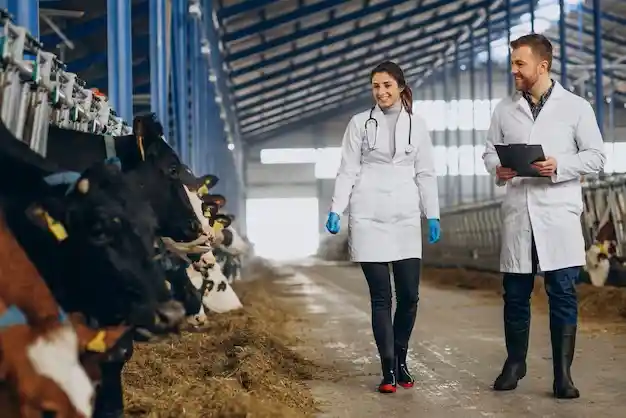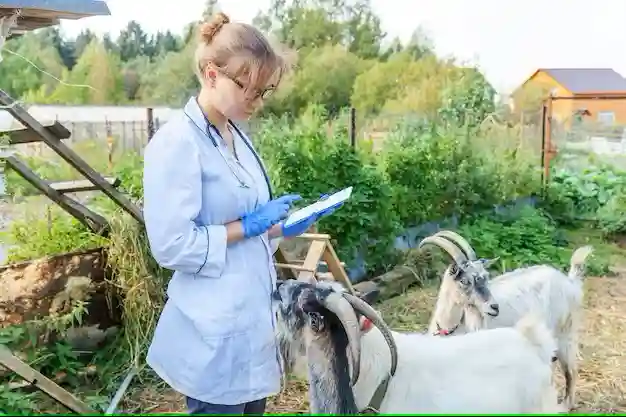Optimizing Local SEO for Animal Feed Suppliers: A Comprehensive Guide

Optimizing Local SEO for Animal Feed Suppliers: A Comprehensive Guide” is your ultimate roadmap to establishing a robust digital presence in the competitive landscape of animal feed supply. In the age of online searches, local SEO is the key to connecting with your local customer base effectively. This comprehensive guide walks you through the fundamental concepts of local SEO, emphasizing its significance for businesses like yours.
You’ll delve into the art of keyword research, discover strategies for on-page SEO optimization, and learn the importance of Google My Business (GMB) listings. Consistency in your NAP information, local link-building strategies, and mobile optimization will be unveiled as vital components of your success. Moreover, you’ll explore advanced techniques such as schema markup and content localization to make your business stand out. With real-world case studies and insights into future trends, this guide equips animal feed suppliers with the tools and knowledge needed to enhance their local SEO efforts and thrive in the digital world.”
Table of Contents

Understanding Local SEO
Understanding Local SEO is the cornerstone of success for animal feed suppliers seeking to thrive in today’s digital marketplace. At its core, Local SEO, or Local Search Engine Optimization, refers to the practice of optimizing your online presence to attract local customers. It’s about ensuring your business appears prominently in local search results when potential customers are looking for animal feed suppliers in their vicinity.
This importance is two-fold: first, it’s about visibility, making sure that your business is easily discoverable when someone nearby searches for relevant keywords. Second, it’s about relevance, ensuring that the search engines recognize your business as a trustworthy and authoritative source for local animal feed supply.
For animal feed suppliers, this matters profoundly. Local SEO ensures that farmers, pet stores, and livestock owners in your region can find your products and services with ease. It’s about connecting with your immediate customer base, building trust, and fostering long-term relationships. With an optimized Local SEO strategy, you position yourself as the go-to choice for local animal feed needs, ultimately driving foot traffic to your store and generating online sales. Understanding the fundamentals of Local SEO is, therefore, an essential step for animal feed suppliers looking to succeed in a digital world that prioritizes local search and convenience.
Keyword Research and Selection
Effective keyword research and selection are critical components of a successful local SEO strategy for animal feed suppliers. These elements can significantly impact your online visibility and ability to connect with potential customers in your target market.
Identifying the Right Keywords for Animal Feed Suppliers
Identifying the right keywords is the foundation of any SEO campaign. For animal feed suppliers, this means selecting keywords that accurately reflect your business and the products you offer. Start with broad terms like “animal feed” and then narrow it down to more specific terms like “organic animal feed” or “livestock feed.”
It’s essential to consider the language that your target audience uses. What terms are local farmers, pet store owners, and livestock enthusiasts likely to search for? These keywords should be integrated into your website content, ensuring that you show up in local search results when people are seeking products you provide.

Long-Tail Keywords for Niche Markets
Long-tail keywords are longer, more specific phrases that cater to niche markets. These terms can be invaluable for animal feed suppliers, as they help you connect with potential customers looking for precise products in your area. For instance, “organic chicken feed for sale in Bangladesh is a long-tail keyword that narrows down your target audience.
Long-tail keywords often have lower competition, making it easier for your business to rank for these terms. While the search volume might be lower, the quality of the traffic they bring can be significantly higher, as these searchers are closer to making a purchase decision.
Tools and Techniques for Keyword Research
Keyword research tools are your best allies in uncovering valuable keywords for your business. Tools like Google Keyword Planner, Moz Keyword Explorer, and SEMrush can help you discover relevant keywords in your niche. They provide insights into search volume, competition, and related keywords.
Competitor analysis is another valuable technique. Examine what keywords your competitors are targeting, and identify gaps in their strategies that you can exploit.
Customer surveys and feedback can also provide you with insights into the language your customers use when searching for products. Regularly update and refine your list of keywords based on your findings and the evolving search landscape.
Effective keyword research and selection are fundamental to successful local SEO for animal feed suppliers. Identifying the right keywords, leveraging long-tail keywords, and using tools and techniques to conduct research can elevate your online presence and help you reach your target audience effectively.
Get a Free One-on-One Consultations
+8801997310000
On-Page SEO Optimization

On-Page SEO Optimization is a pivotal component of any local SEO strategy for animal feed suppliers. It involves fine-tuning elements on your website to improve its visibility in local search results and enhance the user experience.
Optimizing Website Content for Local SEO
Optimizing website content for local SEO means tailoring your text, images, and other media to serve both your audience and search engines. Ensure that your content reflects the products you offer as an animal feed supplier and addresses the specific needs of your local clientele.
Incorporate relevant local keywords naturally within your content. For instance, you can include phrases like “high-quality animal feed in [Your City]” to indicate the locality of your services. This not only aids your SEO efforts but also helps potential customers identify you as a local supplier.
Meta Titles, Descriptions, and Header Tags
Meta titles and descriptions play a crucial role in telling search engines and users what your web pages are about. Create compelling meta titles and descriptions that incorporate your target keywords and provide a brief, accurate description of the page’s content.
Utilize header tags (H1, H2, H3) to structure your content effectively. These tags help both search engines and users understand the hierarchy and importance of your content. Use them to emphasize key information and guide readers through your pages.
Image Optimization
Image optimization is often overlooked but can significantly impact local SEO. Compress images to reduce load times, which is especially vital for mobile users. Add descriptive alt text to your images to make them accessible and improve your chances of appearing in image search results. Additionally, use relevant file names for images.
Content Quality and Relevance
High-quality, relevant content is the backbone of on-page SEO. Animal feed suppliers can create blog posts and articles that address common questions, provide insights on animal nutrition, or offer product guides. Not only does this provide value to your audience, but it also helps search engines identify you as a trusted source of information.
Ensuring that your content is relevant to your local audience is essential. Tailor your content to address the specific needs of local farmers, pet store owners, and livestock enthusiasts. Consider seasonal factors, regional preferences, and trends in your area to keep your content fresh and engaging.
On-Page SEO Optimization is about making your website not only search engine-friendly but user-friendly as well. By optimizing content, meta elements, images, and ensuring content quality and relevance, you can enhance your website’s performance in local search results, attracting more local customers to your animal feed supply business.

Google My Business (GMB) Optimization
Optimizing your Google My Business (GMB) listing is an essential step in local SEO for animal feed suppliers. It’s a powerful tool that not only helps potential customers find you but also allows you to showcase your business information and build credibility. Here’s a closer look at key aspects of GMB optimization:
Claiming and Verifying Your GMB Listing:
The first step in GMB optimization is to claim and verify your listing. If your business already exists on Google Maps, it may have a basic listing. Claiming it and verifying your ownership ensures you have control over your listing’s information and can make necessary updates. This process usually involves receiving a verification code via mail or phone, which you’ll need to enter to confirm your ownership.
Completing Your GMB Profile
Completing your GMB profile is where you can shine a spotlight on your animal feed supply business. Include detailed and accurate information such as your business hours, contact information, address, website URL, and a brief description of your services. Add high-quality images that showcase your products, premises, and staff. Visual content not only captures attention but also gives potential customers a better sense of your business.
Encouraging Customer Reviews and Ratings
Encouraging customer reviews and ratings is a crucial aspect of GMB optimization. Positive reviews and high ratings signal trustworthiness and customer satisfaction. Actively engage with your customers and politely request reviews, especially from your satisfied clientele. Make it as easy as possible for them to leave reviews by providing direct links or instructions.
However, it’s important to remember that authenticity matters. While positive reviews are valuable, it’s equally important to address negative reviews professionally and constructively. Responding to feedback, whether positive or negative, shows that you care about your customers’ experiences and are committed to improvement.
Google My Business (GMB) optimization is a fundamental step in enhancing your local online presence. Claiming and verifying your listing, completing your profile with accurate information, and encouraging customer reviews and ratings all contribute to building trust with your audience and making your animal feed supply business more discoverable in local searches. GMB is a powerful tool for connecting with your local customer base and promoting your business.
NAP Consistency
NAP (Name, Address, Phone) consistency is a crucial factor in local SEO for animal feed suppliers. It ensures that your business information is not only accurate but also trustworthy and reliable. Here’s why NAP consistency is so important and how to maintain it across the web.
Importance of NAP Consistency:
Firstly, NAP consistency builds credibility with search engines like Google. When your business details are consistent across various online platforms, it reinforces your legitimacy and relevance. This consistency reassures search engines that your business is genuine and deserving of higher visibility in local search results.

Secondly, NAP consistency is essential for your customers. Potential clients need to find accurate information to contact or visit your store. Inaccurate or inconsistent NAP details can lead to customer frustration and lost business opportunities. A seamless customer experience depends on reliable contact information.
How to Ensure Consistent NAP Across the Web
To maintain NAP consistency, follow these key steps:
Audit Your Existing Listings: Start by identifying where your business is listed online. This could include directories, social media profiles, your website, and other platforms.
Update and Correct Information: Ensure that your business name, address, and phone number are accurate and up to date. Make corrections if necessary.
Claim and Verify Listings: If your business is listed on platforms like Google Maps, Yelp, or online directories, claim and verify these listings to gain control over your information.
Monitor Regularly: NAP consistency isn’t a one-time task. Monitor your listings periodically to catch any discrepancies and make corrections promptly.
Use Tools: Consider using tools like Moz Local or Yext to streamline the process of managing your business listings and ensuring NAP consistency across the web.
Maintaining NAP consistency is fundamental for both search engines and customers. It establishes trust, reinforces your legitimacy, and ensures a seamless experience for those seeking your services. By regularly monitoring and updating your NAP information, you can enhance your local SEO efforts and connect more effectively with your target audience.
Local link building

Local link building is a pivotal component of local SEO for animal feed suppliers, helping to boost online authority and visibility within your immediate geographic area. This aspect of SEO focuses on acquiring backlinks from local websites, which can significantly impact your search engine rankings and drive more local traffic to your website.
The Role of Local Backlinks
Local backlinks, also known as inbound links or incoming links, are hyperlinks from other websites to your site. In a local context, these backlinks come from websites within your region or niche. They serve as a vote of confidence in your business and indicate to search engines that your website is a valuable resource for local users. Local backlinks tell search engines that your business is a credible and reliable source within the local community.
Strategies for Acquiring Local Backlinks
Local Business Directories: Register your business with local online directories, chamber of commerce websites, and industry-specific directories. These platforms often allow you to include a backlink to your website in your profile.
Collaborate with Local Businesses: Partner with complementary local businesses, such as pet stores or farmers’ markets, and exchange backlinks. Feature each other on your websites or write guest posts that link back to each other.
Sponsor Local Events: Sponsorship of local events, such as agricultural fairs or community fundraisers, can earn you backlinks from event websites. It also showcases your support for the local community.
Create Local Content: Produce content that specifically caters to local audiences. This could be blog posts about regional animal care, local agricultural practices, or community events. Promote this content on social media and ask local websites to link to it.
Importance of Quality Over Quantity
Quality local backlinks hold more weight than a large quantity of low-quality ones. Google and other search engines prioritize backlinks from authoritative, relevant, and trustworthy sources. A few high-quality local backlinks from reputable local websites are more valuable for your SEO efforts than numerous links from irrelevant, low-quality websites.
In local link building, the focus should be on the relevance and authority of the sources. Building relationships with local businesses and organizations that genuinely support your industry and community can lead to valuable, high-quality backlinks that will boost your local SEO and increase your online visibility among your target audience.

Mobile Optimization
Mobile optimization is no longer an option; it’s a necessity for animal feed suppliers who want to succeed in the digital landscape. With a growing number of users relying on mobile devices to access information, the importance of mobile SEO, a mobile-friendly website design, and fast page speed cannot be overstated.
The Growing Importance of Mobile SEO
Mobile SEO is essential due to the increasing use of smartphones and tablets for online searches. Today, a significant portion of your potential customers is likely to access your website from mobile devices. Therefore, search engines like Google now prioritize mobile-friendly websites, making mobile SEO a critical ranking factor. Ensuring that your website is mobile-optimized not only boosts your search engine rankings but also provides a better user experience, which can lead to increased conversions and customer satisfaction.
Mobile-Friendly Website Design
Mobile-friendly website design, often referred to as responsive design, is a key aspect of mobile optimization. It involves creating a website that adjusts its layout and content to fit various screen sizes, ensuring that the user experience remains consistent and accessible across different devices. This means that your website should be easily navigable and readable on both desktops and mobile devices.
Effective mobile design includes features like large, touch-friendly buttons, simplified navigation menus, and responsive images that load quickly on mobile devices. The goal is to make it as effortless as possible for users to find the information they’re looking for and take action, such as contacting your business or making a purchase.
Page Speed and Mobile Performance
Page speed and mobile performance are integral aspects of mobile optimization. Mobile users expect websites to load quickly, and search engines reward websites that offer a seamless mobile experience. Slow-loading pages can lead to high bounce rates and lost opportunities.
To improve page speed on mobile, consider optimizing images, enabling browser caching, and minimizing unnecessary scripts. Compressing images and reducing the use of large media files can significantly enhance mobile performance. Google’s PageSpeed Insights is a valuable tool for analyzing and improving your mobile website speed.
Mobile optimization is no longer an option but a requirement for success in the digital age. With the growing importance of mobile SEO, mobile-friendly website design, and fast page speed, animal feed suppliers can enhance their online presence and better serve their mobile-using customers. Providing an exceptional mobile experience not only benefits your search engine rankings but also strengthens your connection with your target audience.
Schema Markup for Animal Feed Suppliers
Schema markup is a powerful and often underutilized tool for enhancing local SEO efforts, especially for businesses like animal feed suppliers. Understanding what schema markup is, how to implement it effectively for animal feed suppliers, and the numerous benefits it can bring to local SEO is crucial in boosting your online visibility.
Explaining Schema Markup
Schema markup, or structured data, is a type of code added to your website to provide search engines with detailed information about your content. It helps search engines better understand the context and relevance of your web pages, leading to more informative and visually appealing search results.

For animal feed suppliers, schema markup can be used to provide essential information such as product details, customer reviews, pricing, and business hours. This structured data not only aids search engines in presenting more informative search results but also improves the user experience by displaying relevant information directly in search results.
Implementing Schema for Animal Feed Suppliers
To implement schema markup effectively, you’ll need to use specific markup languages like JSON-LD or Microdata. The markup should align with the content on your website, incorporating details such as product names, descriptions, prices, and customer ratings. Additionally, you can apply local business markup to include your business name, address, and phone number.
There are schema markup generators available that simplify the process of adding structured data to your website. Alternatively, you can hire a professional web developer who is experienced in schema markup implementation to ensure it’s done correctly.
Benefits for Local SEO
Schema markup offers numerous benefits for local SEO:
Enhanced Rich Snippets: By providing search engines with structured data, you increase the chances of your search results appearing as rich snippets, which can draw more attention and clicks from users.
Local Business Information: Implementing local business schema helps search engines understand your location, making it easier for potential customers in your area to find your business.
Product Listings: Schema markup can make your product listings more appealing by including images, prices, and availability information in search results, which can lead to higher click-through rates.
Review Stars: Including review markup can display star ratings in search results, showcasing your excellent customer feedback and building trust with potential customers.
Schema markup is a valuable tool for animal feed suppliers looking to improve their local SEO. It enhances the presentation of your content in search results, making it more informative and visually appealing. By providing search engines with structured data about your products and business, you can stand out in search results, attract more local customers, and ultimately enhance your online visibility.
Content Creation and Localization

Content creation and localization play a vital role in local SEO for animal feed suppliers. Crafting relevant, high-quality content, localizing it for specific markets, and incorporating a strategic blogging approach can significantly enhance your online presence and connect with your local customer base.
Producing Relevant, High-Quality Content
Relevant, high-quality content is the cornerstone of a successful local SEO strategy. For animal feed suppliers, this means creating content that addresses the unique needs and interests of your local audience. Content can include informative articles on animal nutrition, care tips, product guides, and more.
The quality of your content reflects your expertise and dedication to your industry. Search engines like Google reward websites that offer valuable, well-researched, and engaging content. This, in turn, can boost your search engine rankings, making it easier for local customers to find your website.
Localizing Content for Specific Markets
Localizing content is the practice of tailoring your content to specific markets, considering regional preferences, cultural nuances, and seasonal factors. For animal feed suppliers, this might involve addressing the unique needs of local farmers, pet stores, or livestock enthusiasts in your area.
Localization ensures that your content resonates with your target audience, making it more relatable and appealing. By using local language and addressing local concerns, you create a sense of trust and belonging among your local customers, which can boost your credibility and customer loyalty.
Blogging and Its Impact on Local SEO
Blogging is a powerful tool for animal feed suppliers to engage with their local audience. Regularly publishing blog posts not only keeps your website fresh and updated but also provides opportunities to target specific local keywords, answer common questions, and showcase your expertise.
Well-optimized blog posts can attract organic traffic and encourage readers to explore other areas of your website. Additionally, you can use your blog to promote local events, partnerships with other local businesses, and special offers, fostering a sense of community and relevance.
Content creation and localization are key to enhancing your local SEO efforts as an animal feed supplier. By producing high-quality, locally relevant content and maintaining an active blog, you can establish yourself as a valuable resource for your local community. This not only strengthens your online presence but also helps you connect with and serve your local customer base more effectively.
Social Media and Local SEO
Leveraging social media for local SEO is a dynamic strategy that animal feed suppliers can employ to boost their online presence and connect with their local customer base. Here are some best practices to consider:
Consistent Branding: Maintain a consistent brand presence across all your social media platforms, with the same profile picture, cover image, and business information. This consistency fosters recognition and trust among your audience.
Engage Locally: Actively engage with your local community on social media. Respond to comments and messages promptly, participate in local discussions and forums, and share content related to local events or agricultural news.

Use Local Keywords: Incorporate local keywords into your social media posts. For example, mention your city or region in posts and captions to make your content more locally relevant.
Geo-Tagging: When sharing photos or updates about your business, use geo-tagging features to let your followers know your exact location. This can help increase your visibility in local searches.
Encourage User-Generated Content: Encourage your customers to post about your products or services on social media and tag your business. User-generated content adds authenticity to your online presence and can attract local customers.
Leverage Hashtags: Use relevant local hashtags to broaden the reach of your posts and make your content more discoverable to a local audience.
Promotions and Special Offers: Use social media to promote local events, discounts, and special offers. This can attract local customers looking for deals and build excitement around your business.
By following these best practices, animal feed suppliers can harness the power of social media to strengthen their local SEO efforts. Social media not only enhances online visibility but also creates opportunities to build meaningful relationships with the local community, ultimately driving more local customers to your business.

Online Reviews and Reputation Management
Online reviews and reputation management are integral aspects of local SEO for animal feed suppliers. Positive reviews and a strong online reputation can significantly impact your business’s success, while negative reviews require careful management.
Encouraging and Managing Online Reviews:
Actively encouraging and managing online reviews is essential for building a positive online reputation. Encourage satisfied customers to leave reviews on platforms like Google, Yelp, and social media. Make it easy for them by providing links and clear instructions. Respond promptly and professionally to all reviews, whether positive or negative. Acknowledge positive feedback with gratitude, demonstrating your commitment to customer satisfaction. Engage constructively with negative reviews, addressing concerns and offering solutions.
Dealing with Negative Reviews
Negative reviews can happen, and how you handle them is crucial. When responding to negative reviews, remain calm and professional. Address the issue, apologize if necessary, and offer a solution or steps to rectify the situation. This shows potential customers that you are responsive and committed to resolving problems. Sometimes, negative reviews can even turn into positive ones when customers see your dedication to their satisfaction.
Building a Positive Online Reputation
Building a positive online reputation takes time and consistent effort. To do so, consistently deliver excellent products and service, which will naturally result in positive reviews. Encourage satisfied customers to share their experiences, and maintain a strong online presence by regularly updating your website and social media profiles with valuable content. Engage with your local community through events, sponsorships, or partnerships to build goodwill.
Remember that a positive online reputation is not just about good reviews; it’s about demonstrating your dedication to customer satisfaction and being an active, trustworthy, and reputable member of your local community. A strong online reputation will enhance your local SEO efforts and make your animal feed supply business more appealing to potential customers.

Measuring and Tracking Success
Measuring and tracking success is a critical part of local SEO for animal feed suppliers. To determine the effectiveness of your SEO efforts and make informed decisions, it’s essential to focus on key performance indicators (KPIs) and utilize the right tracking and analytics tools.
Key Performance Indicators (KPIs) for Local SEO:
Local Keyword Rankings: Monitoring your rankings for specific local keywords is fundamental. An increase in rankings can indicate improved visibility in local searches.
Organic Traffic: Tracking the volume and sources of organic traffic to your website can help you understand the impact of your SEO efforts.
Click-Through Rate (CTR): Assessing the CTR for your search results is crucial. A higher CTR suggests that your listings are compelling and attractive to local searchers.
Conversion Rate: Measuring the rate at which visitors complete desired actions, such as contacting your business or making a purchase, helps determine the effectiveness of your local SEO strategy.
Local Business Reviews: Monitoring the quantity and quality of online reviews and ratings is important for evaluating your reputation and customer engagement.
Mobile Traffic and Performance: With the increasing use of mobile devices, tracking mobile-specific KPIs, such as mobile traffic and site performance, is essential for reaching your local audience effectively.
Tools for Tracking and Analytics
Google Analytics: This versatile tool provides valuable insights into website traffic, user behavior, and conversions, making it essential for tracking SEO performance.
Google Search Console: This platform offers information about your website’s performance in Google’s search results, including keyword data and indexing issues.
Local SEO Tools: Tools like Moz Local and BrightLocal are designed specifically for local SEO tracking, offering insights into local rankings, online presence, and reputation management.
Rank Tracking Tools: Solutions like SEMrush and Ahrefs help monitor keyword rankings and provide insights into your competitors’ performance.
Review Management Platforms: Tools like ReviewTrackers and Yotpo can help you track and manage online reviews, enhancing your reputation management efforts.
By utilizing these KPIs and tracking tools, animal feed suppliers can continuously assess their local SEO strategies and make data-driven adjustments to improve their online visibility, reach, and engagement with their local customer base.
Case studies

Case studies provide tangible proof of how local SEO can impact animal feed suppliers. They showcase real-world examples of businesses that have implemented successful strategies to improve their online visibility, connect with their local communities, and ultimately increase sales. These case studies often detail specific challenges, strategies, and outcomes, offering valuable insights and inspiration for other animal feed suppliers looking to enhance their local SEO efforts. By studying these success stories, businesses can identify best practices, adapt strategies to their specific needs, and achieve similar results in their local markets.
Future Trends and Considerations
Staying ahead of the curve in local SEO is crucial for animal feed suppliers. The ever-evolving digital landscape continues to introduce new trends and changes in search algorithms. Here are some future trends and considerations for local SEO:
Upcoming Trends in Local SEO:
Voice Search Optimization: With the rise of voice-activated devices, optimizing for voice search is becoming essential. Animal feed suppliers need to consider how their customers might phrase voice queries and adapt their content accordingly.
Local Structured Data: Leveraging schema markup for local businesses will continue to be vital. Utilizing structured data to provide more context to search engines can improve your chances of appearing in featured snippets and rich results.

Mobile-First Approach: Google’s mobile-first indexing means your website’s mobile version takes precedence in ranking. Ensure your site is mobile-friendly and offers a seamless user experience across various devices.
Localized Content: Tailoring your content to address local concerns and preferences will remain important. Creating content that reflects local events, seasonal trends, and regional nuances can help you connect better with your local audience.
Preparing for Future Changes in Search Algorithms:
Stay Informed: Continuously monitor industry news, updates from search engines, and changes in algorithms. Staying informed allows you to adapt quickly to new SEO requirements.
Adaptability: Be ready to adjust your SEO strategies in response to algorithm updates. Flexibility and adaptability are essential to ensure your SEO efforts remain effective.
Diversify Your SEO Efforts: Relying on a single SEO strategy can be risky. Diversify your efforts across various platforms and channels to mitigate the impact of algorithm changes.
User-Centric Approach: Focus on providing the best user experience possible. Search engines increasingly reward websites that prioritize user needs, loading speed, and mobile responsiveness.
In summary, anticipating and preparing for future trends and algorithm changes in local SEO is vital for animal feed suppliers. Embracing these trends and adopting a proactive, user-centric approach will help ensure your business remains visible and competitive in the ever-changing digital landscape.

FAQ
Local SEO is crucial for animal feed suppliers as it helps them connect with their local customer base, improve online visibility, and increase sales. It ensures that your business appears in local search results, making it more accessible to nearby customers.
Identifying the right keywords involves researching what local customers are searching for. Focus on industry-specific terms, location-based keywords, and long-tail keywords to target your niche market effectively.
To encourage reviews, ask satisfied customers for feedback and make it easy for them to leave reviews. For reputation management, respond professionally to both positive and negative reviews, aiming to address concerns and build trust.
Google Analytics and Google Search Console are essential tools for monitoring your SEO efforts. Additionally, local SEO tools like Moz Local and review management platforms can aid in tracking and managing your online presence.
Future trends include voice search optimization, local structured data (schema markup), a mobile-first approach, and localized content. Preparing for algorithm changes, staying informed, and focusing on user-centric strategies will be crucial in adapting to these trends.
conclusion
Optimizing local SEO is not just an option but a necessity for animal feed suppliers looking to thrive in today’s digital marketplace. Let’s recap the key takeaways from this comprehensive guide:
Local SEO is essential for connecting with your local customer base, enhancing online visibility, and increasing sales.
Focus on understanding and leveraging local SEO techniques, including keyword research, on-page optimization, Google My Business, NAP consistency, local link building, mobile optimization, schema markup, content creation, social media, online reviews, and reputation management.
Measuring success through KPIs and utilizing tracking tools is crucial for ongoing improvement.
Be prepared for future trends and changes in search algorithms to stay competitive in the local market.
In light of these takeaways, we strongly encourage animal feed suppliers to initiate or refine their local SEO strategies. By prioritizing local SEO, you can expand your reach, engage more effectively with local customers, and achieve growth and success in your business. Don’t delay; start optimizing your local SEO today to position your animal feed supply business for a prosperous future.
